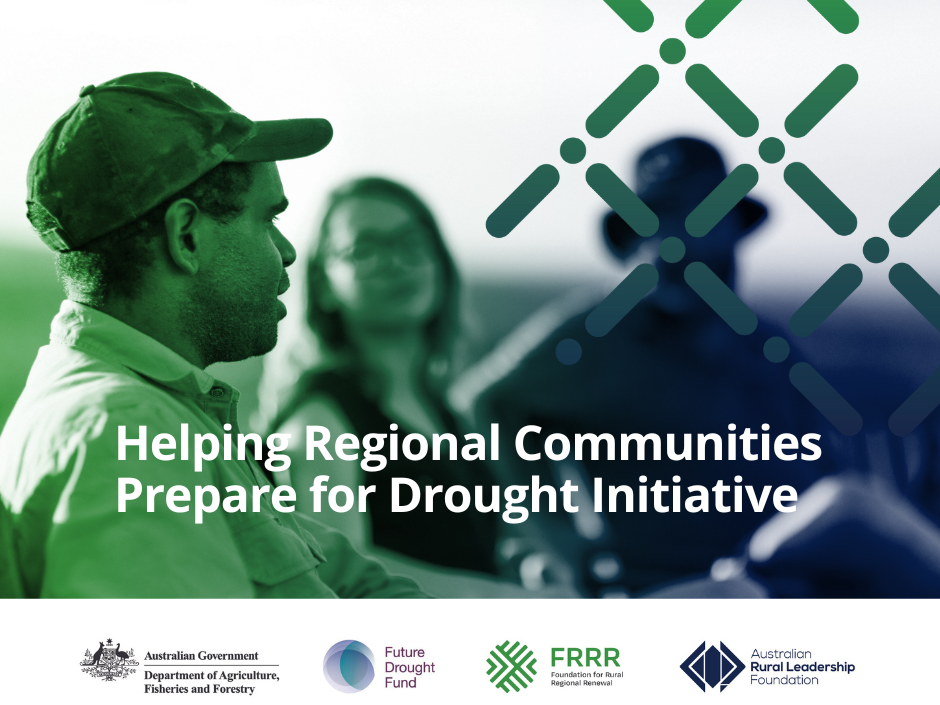Foundation for Rural & Regional Renewal (FRRR)
Local NFP groups sought as lead partners in 35 regions across remote, rural and regional areas
Following the announcement by Senator The Hon. Murray Watt, Minister for Agriculture, Fisheries and Forestry, the Foundation for Rural & Regional Renewal (FRRR) and the Australian Rural Leadership Foundation (ARLF) are pleased to announce the opening of the first program in the Helping Regional Communities Prepare for Drought Initiative.

The Initiative is funded through the Australian Government’s Future Drought Fund and designed to help agriculture-dependent communities across remote, rural and regional Australia enhance their preparedness for drought.
The $29.6 million investment over three years builds on the Future Drought Fund’s previous Networks to Build Drought Resilience program (led by FRRR) and the Drought Resilience Leaders program (led by ARLF).
There are five elements to the Initiative, the first of which is the Community Impact Program. This is a place-based program designed to support community members and not-for-profit organisations in 35 regions across remote, rural and regional Australia to drive local action that helps prepare for drought. An integrated package of support for community networks, there are two main components:
FRRR’s Disaster Resilience and Climate Solutions Portfolio Lead Nina O’Brien said that the program takes a place-based approach, recognising the need for a bespoke approach in different communities.
“Rural communities are better able to withstand the impacts of events like drought when they are strong and well connected. The overall aim of this program is to facilitate increased social connection, strengthen network opportunities and link capacity building opportunities to ensure widespread local benefit, so that communities are better prepared for the future.
“That will look different in each community, which is why we’ll be working alongside community members and organisations to drive local action that best helps each community prepare for drought.
“We’ve clustered LGA’s into 35 regions and we’re seeking a locally-based not-for-profit to act as the lead applicant and work collaboratively with other local organisations to plan and undertake activities that increase drought preparedness over a multi-year period.
“The program has an emphasis on engaging First Nations communities and younger people in leading drought resilience planning and action.
“The Community Impact Grants can fund projects, events, initiatives, training, capability building and small-scale community infrastructure projects.
“This will be a very collaborative program, with FRRR and ARLF working closely on the ground with the successful communities to define priorities, scope and delivery of the project. In addition, there will be access to expertise and networking opportunities,” Ms O’Brien explained.
As part of the program, ARLF will offer a number of optional and complementary Leadership Development Activities at no cost to the successful applicants. These are designed to strengthen the leadership capabilities of communities to build individual and community drought resilience.
ARLF’s Chief Executive Officer Matt Linnegar said that because every lead organisation and region will be at a different point in their resilience journey, ARLF has a number of options that communities can tap into.
“We have five leadership development activities, ranging from intensive residential leadership programs to a series of deep-dives into particular leadership topics to group coaching. Each is underpinned by the concepts of adaptive leadership, resilience and network leadership.
“Applicants will need to include their preference for leadership development activities when they lodge their express of interest for the Community Impact Program, and we will work closely with applicants to refine their preferences as we move through the collaborative project design phase,” Mr Linnegar explained.
The locations and projects in each of the 35 regions will be chosen based on potential drought impact, community readiness and complementarity with other government and philanthropic investments.
Learn more about the program by visiting www.frrr.org.au/impact-program.
Interested groups can also join an online Information Session on 1 September at 12pm AEST. Register here: https://rural-leaders-au.zoom.us/meeting/register/tZIocOmsqzIvH9Re35odkOG0yqt99F7BPEga

